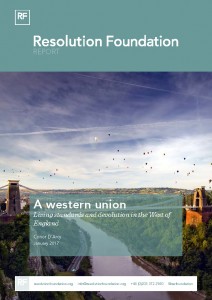Bristol and the West of England should aim to become the UK’s first city-region to have full employment – but it must also tackle a huge social divide made worse by spiralling housing costs.
The challenge has been thrown down to the soon-to-be-elected Metro Mayor, who will lead a combined authority taking in Bristol, Bath and South Gloucestershire, by think tank the Resolution Foundation. 
The new mayor will have powers over funding devolved from Westminster in areas such as skills, transport and infrastructure. For the first time since the former Avon County Council was abolished in 1996, vital decisions in these areas will be taken on a strategic, region-wide basis.
A new report by the Resolution Foundation points to the West’s “impressive economic performance over the last decade”, but also concludes that rising rents and house prices are swallowing up the gains in living standards. It also reveals that in some parts of the region, around half the residents are not in work.
Called A Western Union, the report has been published ahead of the region’s first Metro Mayoral election on May 4.
It shows the region – made up of the Bristol, Bath & North East Somerset and South Gloucestershire local authorities – weathered the financial crisis and its aftermath better than any major city outside London.
While economic output across most major UK cities has not yet returned to pre-crisis levels, output across the West of England city region is at a record high – around 7% above its pre-crisis peak. This has enabled it to extend its advantage over other cities, with output 26% higher than the city region average.
The report shows that the city-region’s strong performance has been underpinned by high levels of employment, which at 76.8% is higher than any other city region in the UK except the Cambridgeshire & Peterborough area.
The strong growth in recent years – the employment rate increased five percentage points in the past three years alone – has put the West at the heart of the UK’s recent jobs miracle.
But the report reveals that while this growth has been broadly shared across the region, areas of low employment remain – in parts of Bristol such as Hartcliffe and Lawrence Hill almost half of residents aren’t in work.
More support for single parents – who are less likely to be employed in the West than in other cities (55% are in work compared to a city region average of 58%) – should also be prioritised, the report says.
A Western Union also warns that for many households the living standards gains from strong economic growth and rising employment are at risk of being swallowed up by even sharper increases in housing costs.
Home ownership is becoming a harder dream to achieve for first-time buyers with average house prices across the area now around 10 times the typical annual salary. This is by far the biggest housing affordability challenge outside of London and Cambridgeshire & Peterborough.
This struggle for first-time buyers is exacerbated by fast-rising rents. Average rents across the city region have increased 14% faster than across other cities between 2011 and 2016 – equivalent to more than an extra £100 a month in rent. As a result, private renters across the West city-region spend a greater share of their pay packets on rent (41%) than any other city outside of London.
The combination of high house prices and fast rising rents have meant that young people in particular are finding it harder than ever to own their own home. Between 2001 and last year the proportion of home-owning 25-39 year olds has plummeted from 69% to just 52%.
The report identifies three policy priorities for the new Metro Mayor to tackle the living standards challenge:
- Build more homes. Housing was a key issue in the recent Bristol Mayoral election, but housing costs are just as big an issue in other areas such as Bath. Given the rising ratio between pay and house prices, a significant boost in house building should be a priority.
- Boost pay for low earners. With 1 in 7 workers set to be on the National Living Wage by 2020, the report calls on the Mayor to promote the higher voluntary living wage and use the £30m a year West of England Single Investment Fund to boost productivity in low-paying sectors to lift people out of low pay altogether.
- Become Britain’s first full employment city. With the highest employment rate of any major city region, the West has an opportunity to become Britain’s first full employment city. Policy action should include back-to-work schemes for those furthest from the labour market – such as single parents – and better transport links to allow less connected and deprived areas to access employment opportunities.
The Foundation says that prioritising these issues should help the city region to maintain strong economic growth, ensure that gains are spread throughout the region and tackle the area’s housing crisis.
Policy analyst Conor D’Arcy said: “While many cities across Britain have struggled to weather the financial crisis, the West of England has performed better than anywhere outside of London.
“The region’s economic success has been underpinned by high employment. With the right policy action, the new Mayor could make the West of England Britain’s first full employment city. To achieve this the Mayor should target support at those who have missed out on the area’s recent job miracle, such as single parents and those living in less connected and deprived areas.
“But while the region’s economy has performed strongly, far too much of the gains from this growth have been swallowed by rising rents and house prices. Tackling the area’s growing housing crisis by building more homes will be key to ensuring people are able to keep more of their hard-earned wages, rather than just handing their pay rises over in higher rent or mortgage costs.”





























